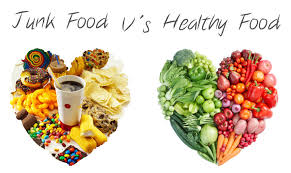
Most fast foods are polar opposites of healthy foods. Fast foods are high in trans fats, sugar and sodium, which can lead to obesity, heart disease and diabetes among other health problems. Healthy foods, by contrast, are high in vitamins, minerals, healthy fats and protein, and they promote energy, good health and longevity.
Fat Content
Fast foods are fried in low-quality cooking oils. The frying process that makes these foods appeal to your taste buds and the pleasure centers in your brain also renders them high in trans fat. Trans fat is one of the most dangerous and health-damaging constituents of fast food. A 2009 research paper published in the "Atherosclerosis Journal" stated that trans fats cause inflammation and calcification of arterial cells and pose such a serious threat that they should "be banned from the food supply.” Both inflammation and calcification of arterial cells significantly increase the risk of heart attack and stroke. Fats from whole foods such as avocados, nuts and unprocessed oils -- such as extra-virgin coconut oil and olive oil -- can lower your risk of heart disease and support weight management and healthy aging.
Sodium Content
The excessive use of sodium in fast food makes it flavorful -- and addictive. While sodium is a necessary nutrient in the human diet, it is very easy for most people to get the recommended dosage without even trying, because it occurs naturally in most foods. While the National Institutes of Health recommends a sodium intake of 2,300 milligrams per day, Americans are exceeding that amount by 1,000 milligrams daily. A diet containing too much sodium can lead to high blood pressure and heart disease. Keeping a balanced diet consisting of whole, unprocessed fruits and vegetables, which are naturally very low in sodium, can be very effective in keeping sodium levels within the recommended range.
Sugar Content
Similar to sodium, many fast foods are very high in sugar, which carries its own health risks. Diets high in sugar are directly linked to obesity. A 2008 study published in the "Journal of Hypertension" concluded that diets high in sugar accelerated cardiac systolic dysfunction and mortality compared to low-sugar diets. A 21-ounce chocolate milkshake from one fast food chain contains 111 grams of sugar, which is 79 grams more than the daily total recommended by the American Heart Association. The refined sugars found in fast foods provide little nutritional value, whereas sugars found in fruits and other natural sources provide vitamins and minerals, and they are digested more slowly, because they are paired with fiber, which prohibits insulin levels from spiking.
Whole Foods vs. Processed Foods
The key differences between fast foods and health foods have to do with the processing that fast foods go through along with the added fat, trans fat, sugar and sodium. These characteristics are responsible for increased rates of obesity, heart disease, diabetes and stroke. Foods found in nature -- when consumed in their unadulterated forms -- provide nutrients that promote good health and vitality without the excess calories or unhealthy additives.
![]()
Disclaimer: This website is for information purposes only. By providing the information contained herein we are not diagnosing, treating, curing, mitigating, or preventing any type of disease or medical condition. Before beginning any type of natural, integrative or conventional treatment regime, it is advisible to seek the advice of a licensed healthcare professional.


























